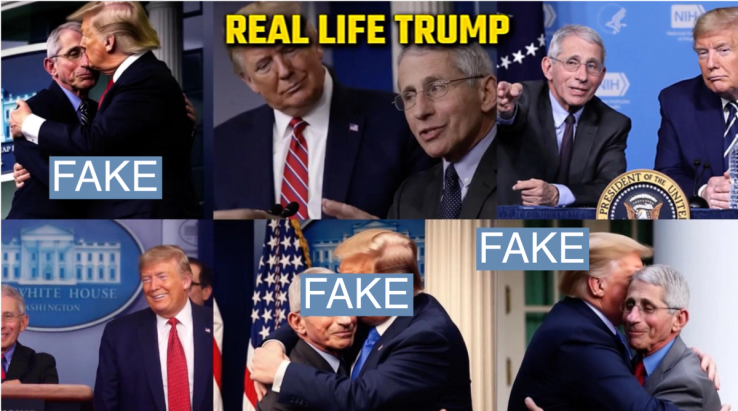The News
Trump supporters are crying foul after Ron DeSantis’ campaign used what appeared to be AI-generated or otherwise doctored images of Donald Trump embracing Dr. Anthony Fauci, in what’s perhaps the most significant skirmish yet over the rapidly-expanding use of manufactured images in 2024.
“Smearing Donald Trump with fake AI images is completely unacceptable,” Senator J.D. Vance, R-Ohio, who has endorsed Trump, tweeted. “I’m not sharing them, but we’re in a new era. Be even more skeptical of what you see on the internet.”
The images were featured in a video shared by the DeSantis War Room, the campaign’s primary vehicle for Twitter fights with Trump’s supporters, which have been frequent and rowdy. The caption in bold yellow letters as they appeared: “REAL LIFE TRUMP,” a reference to the video’s contrast with “REALITY TV TRUMP.”
The DeSantis campaign has not denied the images are fake, but did not respond to Semafor when asked whether they were generated by AI or produced by other means.
Benjy and Shelby’s View
The DeSantis video may be a long-predicted landmark: A widely distributed, digitally generated image produced by a presidential campaign that’s clearly intended to appear real to the casual viewer as part of an attack on an opponent.
“It does stand out as new to me,” Will Adler, election technologist at the nonprofit Center for Democracy and Technology, told Semafor. Unlike recent uses of AI-generated stills and video in campaigns, he said, people could “reasonably think these are real pictures that actually illustrate something that happened.”
The early days of the Republican 2024 contest have already been a turning point in the use of AI and other digitally produced or altered imagery. But in most cases, they’ve been either clearly labeled, obvious parodies, or relatively minor embellishments. Darker uses, like images intended to actively deceive voters by showing an event that never occurred, have seemingly been confined to supporters outside the campaigns.
The RNC kicked things off with an anti-Biden video featuring images — labeled as AI in the clip — of imagined global unrest. The DeSantis campaign drew further attention with an ad featuring fake fighter jets screaming overhead.
Supporters are also constantly generating satirical AI content, which the campaigns sometimes pass on themselves. Trump himself shared a video mocking DeSantis’ Twitter Spaces launch with AI voices that included figures like Adolf Hitler and George Soros, while Donald Trump, Jr., passed around a video that — with impressive realism — swapped in DeSantis’ face and voice over a scene from The Office.
By escalating the AI and fake imagery war in response, the DeSantis campaign runs political risks as well as ethical ones. One of the two candidates has a particular reputation for sharing unverified and misleading images and claims that flout traditional political bounds. The DeSantis team may be compromising their ability to push back later.
The View From DeSantis Land
“This was not an ad, it was a social media post,” a person with knowledge of the political operation told Semafor. “If the Trump team is upset about this, I’d ask them why they have been continuously posting fake images and false talking points to smear the governor.”
The View From Trump World
“Fake images from a fake campaign for a fake candidate. This stunt had the ‘please clap’ energy of Ron DeSanctimonious’ mentor, Jeb Bush,” a Trump advisor said.
Notable
AI experts, good government groups, and lawmakers have been loudly warning that fake digital videos and images could upend campaigns. The American Association of Political Consultants put out a statement last month condemning “deep fake” stills and video as a “dangerous threat to democracy” that pose unique challenges versus prior misleading content. “Citizens must have confidence in the basic truthfulness of political campaigns,” the group wrote.

